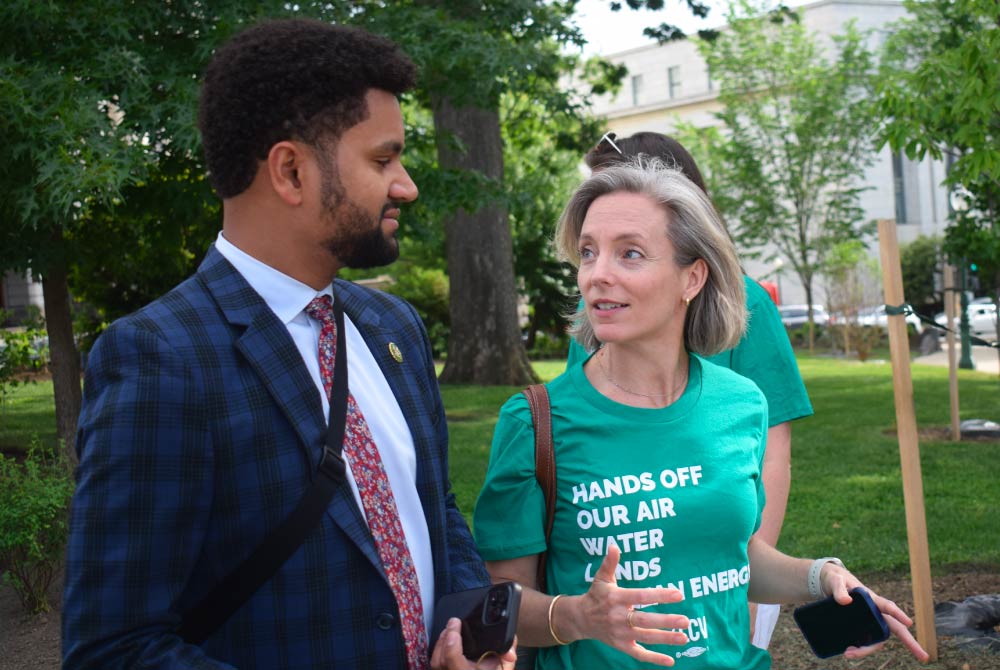
Top 5 Stories Worth Reading – June 2025
Jun 30, 2025
Black History Month provides a time to pause, reflect, and honor those who have set the stage for our country’s current — and future — progress. From advocating for the Voting Rights Act of 1965 to protesting an EPA decision establishing a landfill in a majority-Black community in Warren County, North Carolina in 1982 — protests widely credited with giving rise to the modern environmental justice movement — Black leaders and activists have worked for decades to ensure that all communities have equal opportunities to build lasting political power and live in healthy, safe environments.
Today, LCV activists, volunteers, and dedicated supporters continue to work toward a more just and equitable democracy that is responsive to all people and their will to protect the planet.
This month’s first Top 5 story, below, illustrates one of many approaches LCV uses to realize this vision. By investing in the work of our 30+ state affiliates in the Conservation Voter Movement (CVM) to strengthen and defend pro-democracy policies at the state and local levels, we aim to protect and expand voting rights for historically excluded communities and for all people in this country.
LCV’s commitment to racial and environmental justice is central to our work. We are proud to continue the progress made by those who came before us by working in partnership with those leading the democracy and environmental justice movements today.
And now, here are LCV’s Top 5 stories from February 2023:
1. LCV Invests in Efforts to Strengthen Democracy in 17 States
LCV’s collaboration with our 30+ state affiliates is a critical component of our effectiveness, allowing us to hold leaders accountable and win strong policies at all levels of government. Earlier this month, LCV announced an initial half-million dollar investment in pro-democracy advocacy efforts across 17 state affiliates, with a focus on protecting voting rights in historically excluded communities. Funds will be used by our state partners in a variety of ways to strengthen policies at the state and local levels — while also fighting against election deniers and supporters of the Big Lie as they attempt to undermine the will of voters nationwide. Learn how this investment will help expand and protect voting rights in key states.
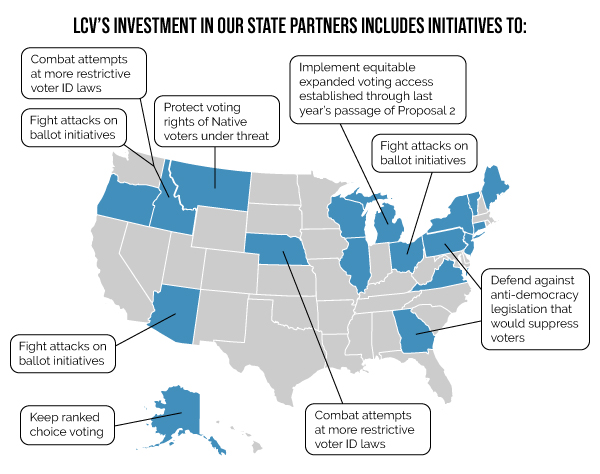
2. Critical Public Lands Protected
The world’s largest intact temperate rainforest is now protected, thanks to the Biden-Harris administration’s restoration of the Roadless Rule in Alaska’s nine million-acre Tongass National Forest. In addition, the administration has recently protected Minnesota’s Boundary Waters Canoe Area Wilderness from new mining. And it has protected Alaska’s Bristol Bay from the immensely destructive Pebble Mine, safeguarding this critical watershed for the people and wildlife who depend on it.
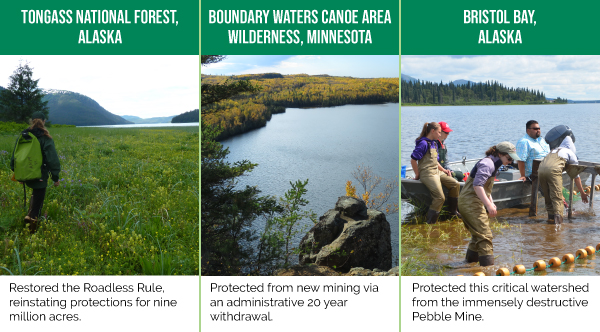
The administration’s recent actions will help protect pristine wilderness areas, wildlife, a massive carbon sink, and the traditional homelands of many Indigenous tribes. These wins are a result of our direct advocacy, collaboration with state partners and tribal leadership in coalitions, and people of color-led organizations working to defend cherished public lands from exploitation by polluters and preserve them for current and future generations.
3. Minnesota Enacts 100% Clean Electricity Law
Elections matter. After LCV’s state affiliate, Conservation Minnesota, helped win a pro-climate majority by a single seat in the Minnesota state Senate last November, climate champions in the state House and Senate passed the 100% Clean Energy bill, and Governor Tim Walz has since signed the legislation into law.
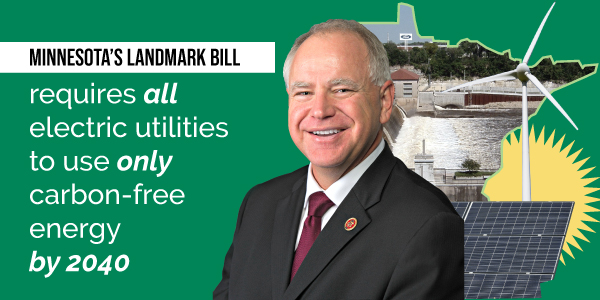
To secure this historic legislation, Conservation Minnesota launched expansive digital ads and a radio ad in 16 key districts, and for the first month of the legislative session was the highest spending advocacy group in the state. The new law requires all Minnesota electric utilities to use 100% carbon-free energy sources by 2040. Upon enactment, Minnesota will join 15 other states committed to 100% clean electricity, achieved in large part thanks to LCV’s Clean Energy for All (CEFA) campaign. Learn about Minnesota’s history-making law.
Related: Read our memo about the biggest opportunities for state climate progress in 2023.
4. New Jersey Governor Announces One of the Nation’s Strongest Clean Energy Executive Orders
New Jersey Governor Phil Murphy once again placed the Garden State at the forefront of the fight against climate change by setting one of the most ambitious clean energy goals in the nation — 100% clean energy by 2035. Governor Murphy was the first gubernatorial candidate in the country to campaign on 100% clean energy and has made the environment a priority since being elected in 2017.
The governor’s recent executive orders stem from years of advocacy by LCV’s Clean Energy for All (CEFA) campaign and the critical work of our state partner, New Jersey LCV (NJLCV). In 2017, NJLCV began asking gubernatorial candidates if they would commit to 100% clean energy by 2050, and every Democratic candidate said yes. NJLCV also mobilized volunteers to press candidates about environmental issues at events, secured media coverage, and produced a 40-page briefing book outlining how to achieve 100% clean energy in New Jersey.
These efforts and subsequent strategic work set the stage for Governor Murphy’s recent executive orders, which provide a roadmap to 100% clean electricity, allocate funding to lower the cost of heavy-duty electric vehicles, update coastal rules to protect families and businesses, commit to electrify hundreds of thousands of homes and businesses, and set a goal for 100% of new cars sold in New Jersey to be zero-emission vehicles by 2035. Read more about New Jersey’s commitments to clean energy.
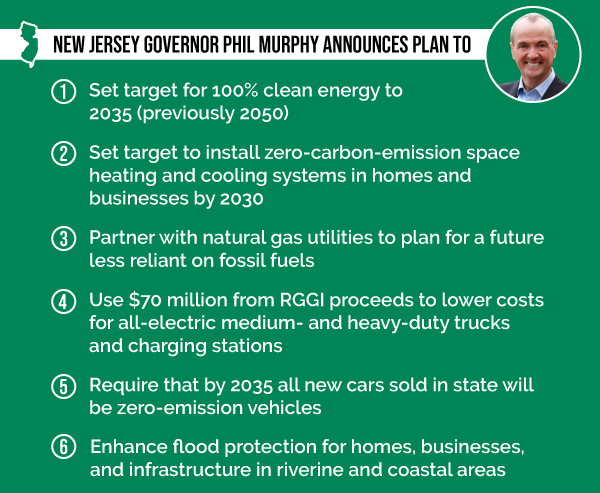
5. Governors Nationwide Commit to Climate Action
State and local progress — along with continued federal action — is critical to securing our path to a clean energy future. Thankfully, governors across the country are making major climate and clean energy commitments, positioning them to work with state legislatures to continue advancing urgently-needed climate solutions. At the same time, President Biden’s recent State of the Union address highlighted his administration’s powerful commitment to clean energy. The Biden-Harris administration has already done more to tackle the climate crisis than any presidential administration in U.S. history, and LCV continues to urge them to do even more to equitably address climate change through executive action and regulations.
Additionally, much of the success of federal investments in equitable clean energy and climate action lies in the hands of the state and local officials who will implement funds from the historic Inflation Reduction Act (IRA) and Infrastructure Investment & Jobs Act (IIJA), so leadership from governors is critically important. Read more about governors’ commitments to climate action.